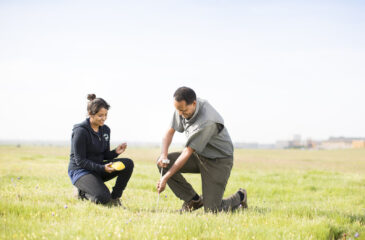Post Tagged with: "Data"
-
Pathways to Open Access: Open Infrastructure and CDL
The Pathways blog series highlights CDL’s efforts on various pathways to open access and illustrates how diverse approaches can complement and reinforce each other–and how they can raise productive tensions that push us to think more critically about the work we do. We believe this kind of approach can move us toward true and comprehensive transformation of the scholarly communications landscape. What is the strategy described in this post? In this post, we focus on open infrastructure. While this topic is not always prominent in discussions about open access, it has become an essential part of our strategy at CDL and underpins […]
-
Why the UC Research Data Policy is Important
What do a court case victory over PETA, recovered research data from a ransomware attack, and a dispute over Alzheimer’s data have in common? They are all front-page examples of UC stepping in to protect its investigators and data assets to ensure continuity of research. However, there are plenty of other examples of UC’s commitment to protecting the ability of its employees to conduct research that often don’t catch the eyes of news outlets. They include, for example, sifting through regulations affecting research, working with funding agencies to clarify proposed policy changes, executing complex research agreements to further collaborations, and […]
-
Draft policy on University of California research data open for second round of review
The draft of the Presidential Policy on University of California Research Data is now open for a second round of systemwide review. The purposes of the policy are to 1) clarify ownership of and responsibility for research data generated during the course of University Research, 2) encourage active data management practices, and 3) provide guidance with respect to procedures when a researcher leaves the University. Ownership of research data by the UC Regents is a long-standing precept originally articulated in Regulation 4 (Academic Personnel Manual 020), where it states “Notebooks and other original records of the research are the property […]
-
COVID Tracking Project archives donated to UC
In March 2020 the COVID Tracking Project at The Atlantic took on the responsibility of posting COVID-19 cases, testing, hospitalization, and death counts in the United States. The effort, led by The Atlantic and a team of 500 volunteers, proved to be invaluable when this key information was not otherwise reliably available as the worldwide pandemic unfolded. The entirety of the COVID Tracking Project archives have been donated to UCSF, in collaboration with California Digital Library. Further, the raw data have been published in Dryad, a data repository that University of California is closely tied to. To read more about […]
-
Doing it Right: A Better Approach for Software & Data
Researchers at UC and around the world now have access to streamlined workflows for publishing their research data and software – and linking the two – through Dryad and Zenodo. UC campuses and California Digital Library have long invested in open data initiatives and support for data publishing. In 2018, CDL partnered with Dryad, an open access data publishing platform. Dryad, founded by researchers and closely connected to and recommended by journals and funders, has been around for over a decade and has long been supported across the globe. While Dryad’s partnership with CDL has allowed for a seamless and […]
-
Draft policy on Research Data and Tangible Research Materials currently under review
A new Presidential Policy on University of California Research Data and Tangible Research Materials is currently under systemwide review. This draft policy addresses issues concerning the ownership of data and tangible materials generated during the course of UC research. All members of the UC community are encouraged to read the policy and accompanying information available below and submit any comments by April 7, 2021. As stated in the policy, “Access to and use and retention of Research Data and Tangible Research Materials are not only critical to substantiate results, but also to provide a foundation for the advancement of scholarship. […]
-
Redundancy is resistance: share your scholarship
Who has the right to make your scholarship available? Who is able to read it? And who can disappear it? If you haven’t given these questions much thought to date, it is worth having a fresh look as national conversations about the power of information—and the awful power of misinformation—continue to grow in prominence. It is a bleak testament to the importance of the academic enterprise that the ways in which scholarship is made and accessed are disputed territory in the campaign against facts.
-
California Digital Library supports the Initiative for Open Citations
The California Digital Library, along with 33 other stakeholders and 29 journal publishers, recently signed on to support the Initiative for Open Citations which will free citation data to the public. Daniella Lowenberg, Research Data Specialist / Dash Product Manager at CDL, wrote this post for the CDL Data Pub blog to announce CDL’s support for the initiative. We’re cross posting it here at the OSC blog to help spread the word. California Digital Library (CDL) is proud to announce our formal endorsement for the Initiative for Open Citations (I4OC). CDL has long supported free and reusable scholarly work, as […]
-
Statement on Commitment to Free and Open Information, Scholarship, and Knowledge Exchange
The University of California Office of Scholarly Communication (OSC) and the University of California Libraries issue the following statement in response to recent actions by the new federal administration and in order to address resulting concerns about continued open access to and preservation of information, scholarship, and knowledge. The unfettered exchange and careful preservation of information are fundamental to democracy, progress, and intellectual freedom. The critical research and scholarship conducted by government entities and academic institutions worldwide safeguard and support human rights, public health, the environment, artistic and literary enterprise, scientific and technological innovation, and much more. This scholarship is […]
-
CC BY and data: Not always a good fit.
Last week I wrote about data ownership, and how focusing on “ownership” might drive you nuts without actually answering important questions about what can be done with data. In that context, I mentioned a couple of times that you (or your funder) might want data to be shared under CC0, but I didn’t clarify what CC0 actually means. This week, I’m back to dig into the topic of Creative Commons (CC) licenses and public domain tools — and how they work with data.






